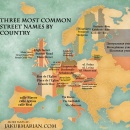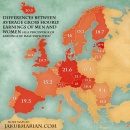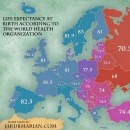 |
What does “idiomatic” mean when speaking about language?
An idiom is an expression whose meaning cannot be directly derived from the meanings of the words it contains. Hence one of the meanings (...)
March 17, 2015 – Jakub Marian – English
|
 |
Most common street names by country in Europe
A map showing the most common street names by country with English translation and a list of sources. (...)
March 11, 2015 – Jakub Marian – Maps
|
 |
Poe’s poem The Raven explained for English learners
Each line of the poem (apart from the last line of each stanza) is divided into two halves in the following text (which is based on my (...)
March 9, 2015 – Jakub Marian – English
|
 |
‘Eat healthily’ vs. ‘eat healthy’ in English
When you want to express that the manner in which you eat is healthy, you can do so using the adverb “healthily” (or “healthfully”) or by (...)
March 6, 2015 – Jakub Marian – English
|
 |
Differences between average hourly wages of men and women in Europe
There are several reasons why women earn less than men on average, most notably low representation of women in high-paying positions, such (...)
March 5, 2015 – Jakub Marian – Maps
|
By the way, have you already seen my brand new web app for non-native speakers of English? It's based on reading texts and learning by having all meanings, pronunciations, grammar forms etc. easily accessible. It looks like this:
 |
What does it mean for a function to be well-defined?
A common addendum to a formula defining a function in mathematical texts is, “it remains to be shown that the function is well defined.” (...)
March 3, 2015 – Jakub Marian – Mathematics
|
 |
Irregular English verbs: -ake to -ook (take, shake, forsake)
A few English verbs follow the pattern -ake → -ook → -aken in the past tense. They are all derived from the verb “take”, apart from (...)
March 2, 2015 – Jakub Marian – English
|
 |
Map of life expectancy in Europe
Life expectancy at birth is defined as the number of years a newly born individual in the given country is expected to live on average, (...)
February 25, 2015 – Jakub Marian – Maps
|
 |
Irregular English verbs: -eave to -eft
There are only three English verbs that follow the pattern -eave /iːv/ → -eft /ɛft/, namely (listed as infinitive – past tense – (...)
February 23, 2015 – Jakub Marian – English
|
 |
‘Than I’ vs. ‘than me’ in English
There has been an ongoing debate whether the correct form after “than” is I, he, she, we, and they or me, him, her, us, and them. (...)
February 23, 2015 – Jakub Marian – English
|
